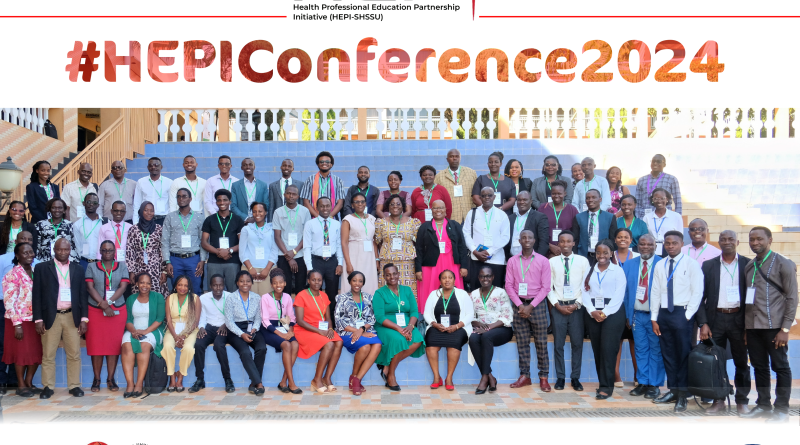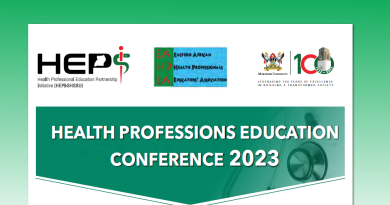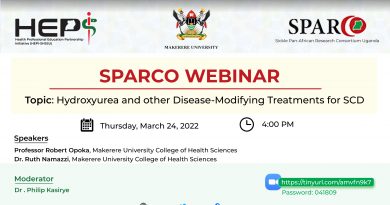HEPI Conference 2024 Story Article
Conference on advances in Health Professions Education held successfully
The Health Professional Education Partnership Initiative (HEPI), led by Prof. Sarah Kiguli, successfully organized and hosted its annual conference on Health Professions Education (HPE) between 17th and 18th April 2024 in Kampala. The conference was organized against the backdrop of identifying ways of strengthening research in HPE and graduate training of health professionals so as to increase the pool of specialists trained in the country. It brought together stakeholders in the health education and regulation sectors to discuss advances in research, innovations in teaching, learning and quality assurance.
Opening remarks featured Prof. Kiguli and Dr. Rose Nanyonga Clarke, Vice Chancellor, Clarke International University. Prof. Kiguli introduced HEPI as a project whose goal is to improve Uganda’s health service delivery through strengthened interdisciplinary health professional education and research training. Furthermore, she told participants that HPE is a fairly new field and such a conference helps key stakeholders to rethink ways of how to integrate innovations into it.
On the other hand, Dr. Nanyonga Clarke, the Guest of Honor, highlighted three crucial aspects for HPE namely: amplifying research as a nexus for learning, teaching and practice; transforming the HPE landscape via student-centered pedagogies and making quality assurance in organizational identity.
“For quality assurance, we need to develop a sustainable framework for faculty development by amplifying development and creating thrive circles and pathways for professional development. When faculty thrive, so does the quality of learning and engagement,” Dr. Nanyonga said.
The keynote speaker, Prof. Joel Okullo, chairman, Uganda Medical & Dental Practitioners Council (UMDPC) outlined challenges and opportunities in quality assurance and accreditation in HPE in Uganda. Challenges included: mushrooming unplanned and under equipped training institutions; poor planning for human resources for health; severe shortage of staff in biomedical sciences; reluctance to address the areas of weakness identified; resorting to courts of law to undermine enforcement efforts by the regulators and failure to understand the importance of regulation and accreditation.
In lieu of the above challenges, he proposed the following recommendations:
- Strengthen laws that govern regulation
- Rigorously regulate setting up of training institutions
- Embrace and promote use of new technologies
- Medical education for trainers
- Plan for and implement inter-professional training
Existing opportunities to close these gaps, according to Prof. Okullo include: research; use of technology(simulation); monitoring implementation and curriculum review.
The two-day conference included rich and diverse presentations and discussions on the theme and subthemes. Participants from various universities (Busitema, Kabale, Clarke International, Lira, King Ceasor and Makerere) shared findings from their research studies and expertise during the conference. Shared studies include: Perception towards E-learning among students at Mulago School of Nursing and Midwifery; Simulation based training to improve neonatal intensive care services in Karamoja sub region; Medical students’ experience with ChatGPT and other Artificial Intelligence tools; Facilitators and barriers to inter-professional education and collaborative practice within a clinical learning environment; Leveraging Quality Assurance for continuous improvement and innovation and Nursing students’ experiences of caring for dying patients at Mulago Hospital, among others.
Additionally, three panel discussions underscoring themes of ‘Nursing education in Uganda’; ‘Enhancing undergraduate students’ research experiences’ and ‘E-Learning in HPE’ were held. At the end of the two days, the sharing of knowledge, best practices and networking proved immensely beneficial for all attendees.
In her closing remarks, Prof. Kiguli appreciated the participants and called for formation of a HPE association.
“We need to move and work together although HEPI as a project is coming to an end. We need to have an association for Ugandans where we shall foster a community of learners. Moving forwards, we need to draft a constitution for HPE association before end of July 2024,” she remarked.
As a climax for the event, Prof. Kiguli awarded the project’s four partner institutions (Busitema, Makerere, Clarke International and Kabale universities) in recognition for their collaborative efforts.
For five years now, the HPE conference has been the go-to event for professionals dedicated to advancing strong health systems that improve health outcomes at individual, family, community and population levels. It is sponsored by the National Institutes of Health (NIH) and supported by the African Centre for Health and Social Transformation; Mulago School of Nursing and Midwifery and Yale, Johns Hopkins, Busitema, Kabale and Clarke universities.
For more details on the conference, see resource links below:
HEPI Abstract Book, visit https://hepi.mak.ac.ug/abstract-book/
Twitter / X – @HepiShssu
Website – http://hepi.mak.ac.ug/




